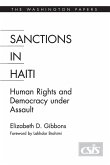Political systems seek to bring about improvement in people's lives; but politics in Haiti has only made the Haitians' lives worse. The notion that politics has failed the Haitian people is explored in this in-depth and balanced analysis of Haiti covering the government, economics, history, external relations, social structures, and future possibilities. The Haitian people have significant self-respect gained from independence in 1804 and sustained by widespread ownership of the land. While other books portray Haiti as a passive victim of U.S./capitalist manipulations, this book identifies the causes of widespread poverty and political instability as the result of multiple external and internal factors centered in the elite-mass relationship, with the resourcefulness of the people blocked by greedy governments. While the authors agree that we have made some mistakes in our relationship with Haiti, they do not blame the United States for Haiti's worst political failure, the Duvalierist system. The authors conclude that if the new government of President Aristide keeps its promises, Haiti can improve. Essential to Haiti's recovery are closer ties to the Caribbean and to the EEC, along with a continuing relationship with the United States. In showing readers the broad historical and cultural patterns in Haiti, the authors contend that while Haiti may seem to be hopeless, its situation economically and politically can be improved. The portrait of the Haitian people is one of self-reliance and creativity, a people eager for free enterprise. Since 1986, Haiti has encountered a favorable external context with the prospect of help from Europe and North America. The Duvalier regime grew out of Haitian realities, and with the help of external relations, the new government may be able to change those realities that still haunt the nation. Scholars and journalists interested in Latin American and Caribbean development, and students of comparative politics and third world countries, will find this study essential reading.
Hinweis: Dieser Artikel kann nur an eine deutsche Lieferadresse ausgeliefert werden.
Hinweis: Dieser Artikel kann nur an eine deutsche Lieferadresse ausgeliefert werden.








